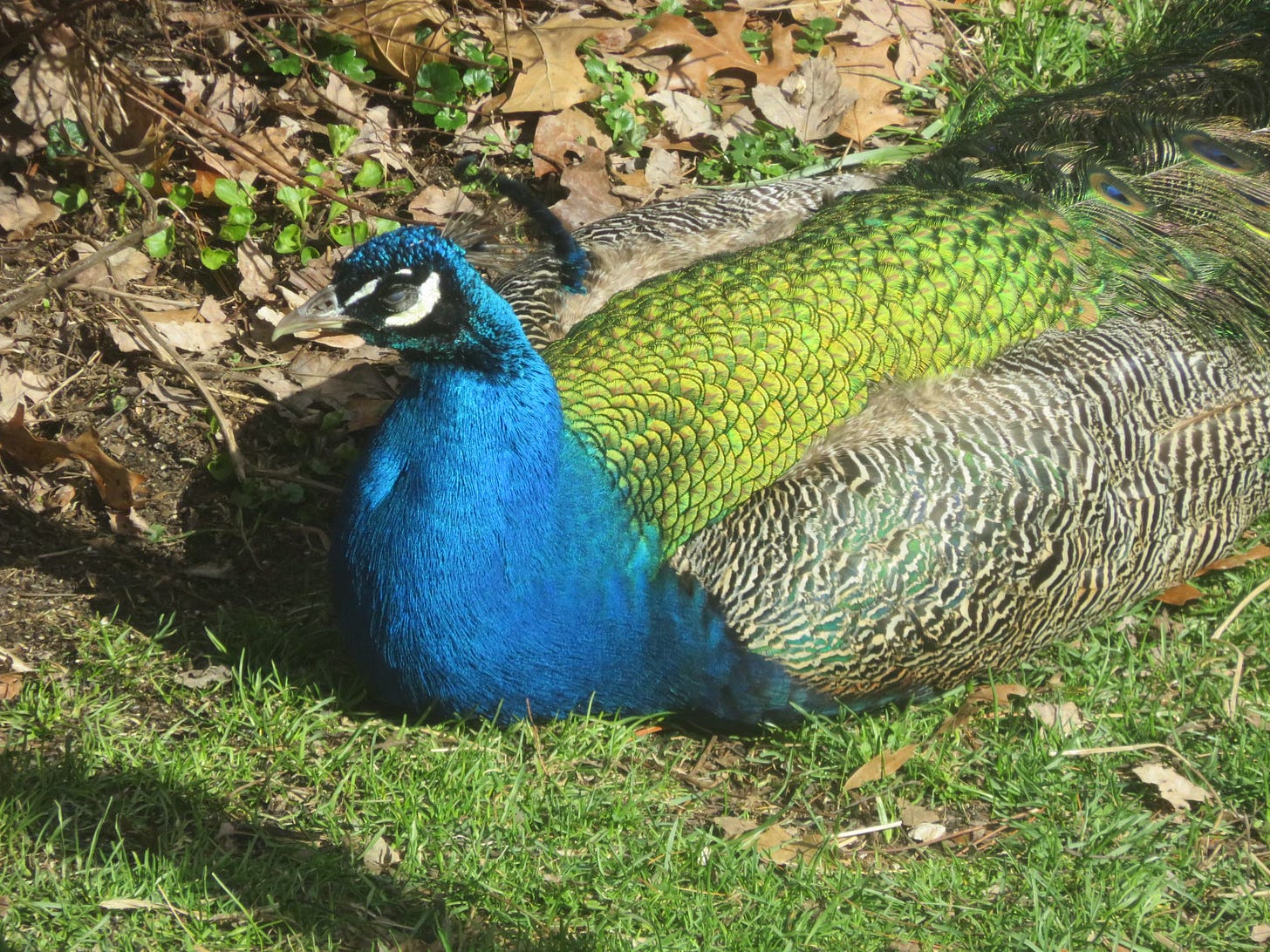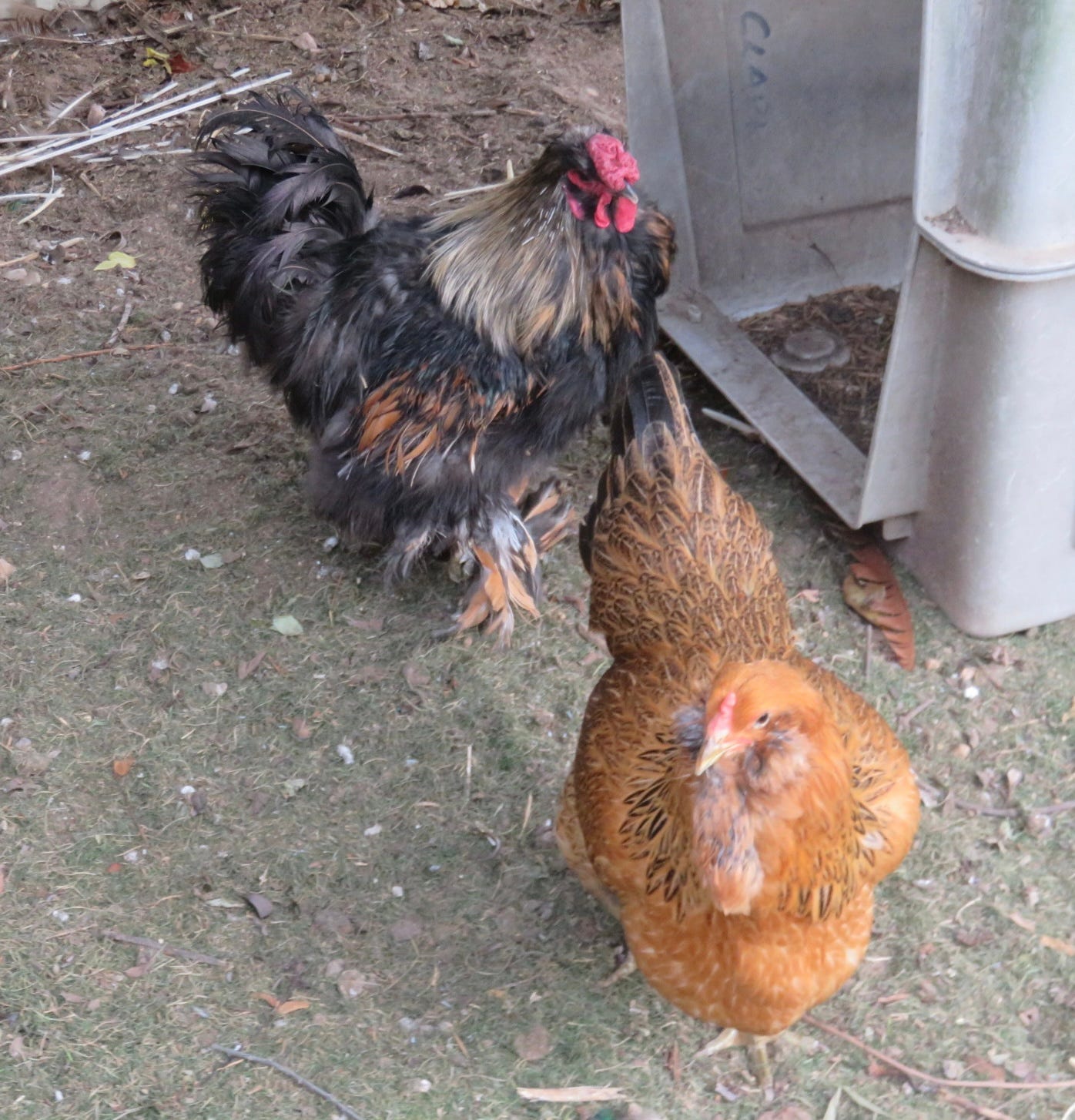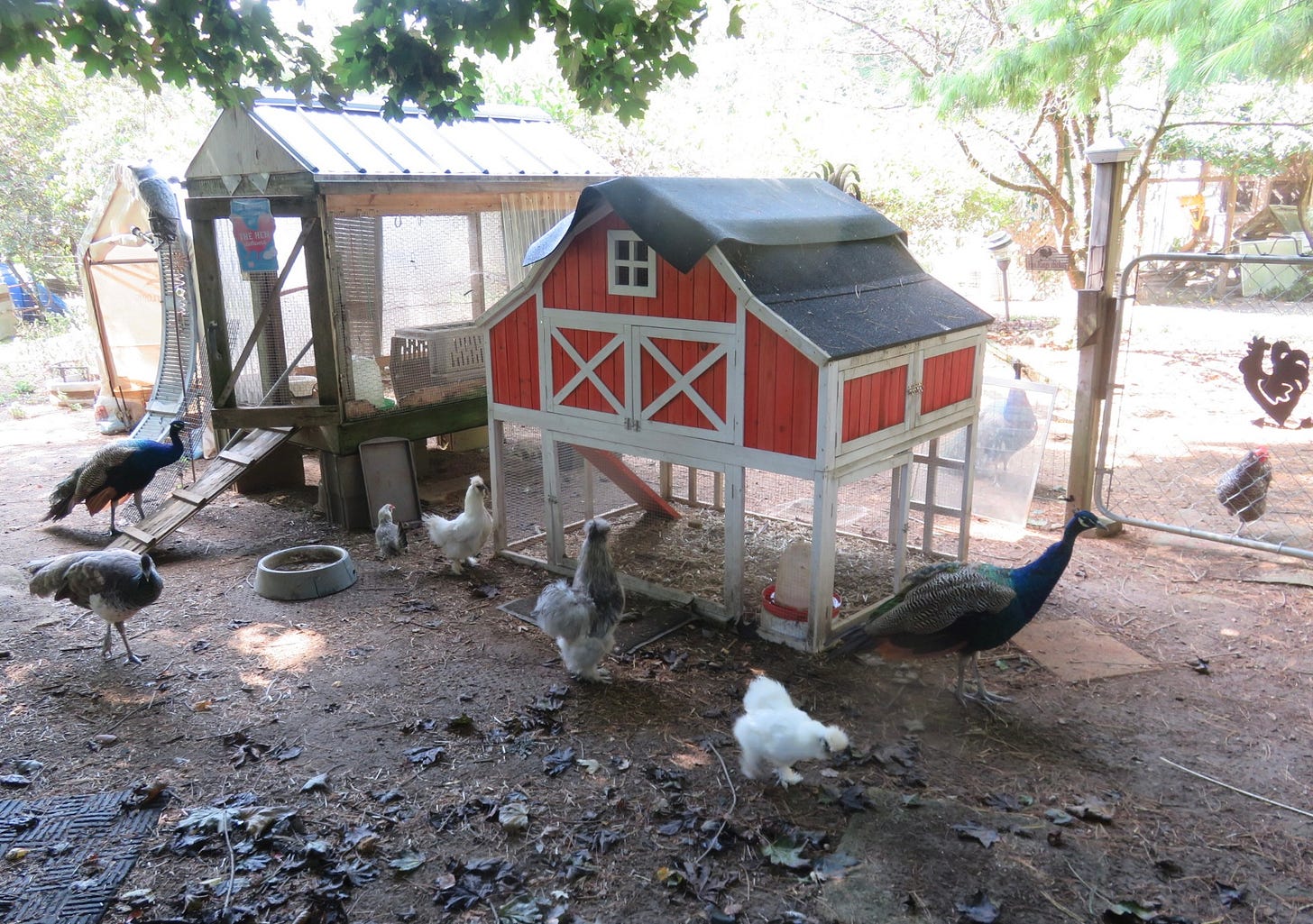There are a number of books to be found if one searches for “the dog doesn’t die.” I know; I’ve searched. I don’t want to read a book or watch a movie if the dog dies, I just don’t. You can kill all the people you want in your story, but don’t kill the dog. I know, it’s sick, but it’s the way I was built.
So in this missive from Darwin’s Eden, the corgis are fine. We built a wonderful enclosure around Dar Park (my husband Bill’s last and my maiden name, shortened) where they can run free, supervised of course, but without fear of chasing a squirrel into the woods or being attacked by coyotes. Perhaps that’s an unreasonable fear, but we HAVE had backyard birds picked off - during daylight hours! - in the past.
So the dogs are well, but we did have some pretty severe losses among our domestic bird population over this past winter. This a tribute of sorts to each and every one that we lost, as the ground finally thawed enough here in Michigan to bury them yesterday. This is their eulogy.
First to go was our oldest peacock, Buddy, who had ruled from his chosen roost in what we call the willow pen for at least eighteen years. All of our peafowl roam freely during the day, but most choose the same spot for roosting overnight. We built this particular enclosure over a willow tree that had been struck by lightning. I thought it would be a nice feature in that pen, a thick stump with dead branches on which to roost, as well as rafters holding up a roof to shield the birds from rain, snow, and sun.
However, the tree came back to life, and pushed its way up through the north side of the roof, making it hardly predator proof. But a roosting peacock has few predators, especially with a roof overhead, so when Buddy continued to roost there, it became his home.
He was joined periodically by other peafowl, but it was most definitely his domain. I made a mistake when Buddy was young: I enjoyed having the beautiful birds follow me around the property, so I’d feed them special treats when they were young, taming them somewhat. Buddy especially enjoyed grapes, and I got a kick out of seeing him gulp them down, one after another. However, he was insatiable, and began to invade my personal space if I didn’t have treats for him. I knew that people have been injured by peacocks attacking, so I carried a stick to enforce him keeping his distance.
Unfortunately, years ago, someone brought young children out to visit without prior notice, and they had to scoop the kids up and run when Buddy begged and then chased them. I heard their screams and ran outside, probably losing a good ten years off my life. (Things like that happen so frequently around here that I think I may have already outlived myself.) From then on, we penned Buddy when we knew strangers, especially children, would be visiting. We just didn’t trust him to behave.
Buddy was beginning to grow his beautiful long tail feathers this past December when I noticed him becoming less active, preferring to stay inside the peacock barn where it’s not so drafty, even sleeping in the straw instead of flying up to the rafters to roost. One sub-zero morning before Christmas, when bringing fresh water into the barn, Bill noticed that Buddy barely bothered to move out of the way. Bill gathered him into his arms and brought him inside, where I prepared a blanket next to the radiator. Buddy died there a few hours later, with me stroking his neck and telling him what a good boy he had been, and a brat, too, thanks to me, but we loved him very much.
We also lost a couple of chickens to old age this winter.
One was an ancient black and brown silkie rooster who was blinded in a fight with another cockerel at least ten years ago. After that, he was picked on mercilessly by the other birds, and I had to segregate him. He had the politically incorrect name Blind Guy, BG for short.
In the warm months, he was the sole resident of a little red barn coop next door to the small silkie flock’s residence. I kept him in a large cage inside the warmer peacock barn in winter, where he was joined by the occasional sympathetic hen, including the adopted Aracauna Hunny Bunny, or HB, a year ago last winter.
Last summer, we adopted another lovely brown hen called Chiquita, who immediately fell for BG’s manly charms. He may have been blind, but he had a magnificent voice. He’d stand in the doorway of his little red barn and crow his head off, and Chiquita would come running.
She began to join BG every evening, roosting with him at night and laying her egg in his coop every morning. And this past winter, she chose to join him in his cage in the peacock barn. She took an occasional foray outside, but spent most of her time sharing meals with BG, and snuggled up to him, keeping each other warm at night. Until one morning a few weeks ago, when I found him lifeless on the floor of the cage, Chiquita at his side. She has re-joined her little flock, but I still see her occasionally climb the ramp to the closed-up red barn, and my heart hurts for her.
The other elderly chicken we lost this winter was a black and white barred Plymouth Rock hen with the unimaginative name of Henny. She had provided countless eggs over the years, and had quit laying several years ago, but here at Darwin’s Eden the old ladies live out their lives among their friends. She appeared to be “off her feed” one day and was dead the next. I had brought her inside due to my worry about bird flu in the news, so she “died warm,” but I was still a little nervous and watched the rest of the flock like a hawk for the next few weeks.
Speaking of hawks, a dastardly Cooper’s hawk was the culprit in the loss of three different chickens in the past two months. There was nothing left of a young black silkie rooster named Charlie Two, who was free-ranging one day before I was aware of the ruthless hunter in our midst, leaving a small pile of black feathers in the chicken yard.
The hawk’s next victim was a tiny brown-black bantam hen I called Baby, who was an escape artist. She could always find a way out of the bantam pen, and I had replaced her inside of it that very morning. But that afternoon, I heard a scream and looked out the window just in time to see Baby skidding under the boxwood hedge, the hawk swooping down after her. I grabbed a broom and raced outside, beating the bushes, and the hawk flew out. I raced after it, shaking my fist, but since I hadn’t donned my cleated boots, I slipped and fell hard on the ice covered ground.
I’m getting too old for this stuff, but luckily I didn’t break any bones. Sadly, it was too late for Baby, and my bruises were all for naught. We let the hawk come back to finish its meal, what there was of it. But I didn’t allow that the next time it struck.
I was outdoors filling bird feeders on the opposite side of the house one sunny afternoon in February. I had not been letting the birds free-range in fear of the hawk striking again. Suddenly I heard a commotion signaling the presence of a predator. Hurrying across the yard toward the squawking, it seemed to be coming from the henhouse, a big antique coop that’s home to most of my laying hens. In fact, I didn’t see any chickens in the outside pen at all, so I ran up the steps and yanked the man door open, expecting to see that a raccoon or possum had dug in somehow. Every chicken was flattened up against the far wall, but no predator in sight.
So I went around to the door of the pen and opened it. There’s a big plastic doghouse in there and I caught a movement inside. The Cooper’s hawk’s wings were spread on the floor of the doghouse, and his head jerked around and looked me in the eye. When I saw the hen underneath the hawk, I screamed, and the hawk flew out, practically into my face. It lit on the rafter furthest from me, in search of escape. But instead of flying out the open door behind me, it sailed past and out through a hole in the rusty chicken wire on the other side. We’d been meaning to repair that, but didn’t consider it a real threat. That whole side of the pen is covered in welded wire now, thanks to Bill. Not even a hungry hawk could get in.
Upon examining the chicken in the doghouse, I could find no wounds. But she was dead. I wondered if she’d had a heart attack when pounced on by the hawk. Roughly twice the size of the hawk, she was a beautiful gray Brahma hen weighing close to twelve pounds. I called her Big Girl, or BeeGee, (not to be confused with BG the Blind Guy.) I figured the hawk must have been pretty hungry, to risk flying into a fenced pen, but it also seemed to have quite a taste for chicken, and I didn’t want to encourage that. Let it get the wildlife abounding around here - mice, squirrels, rabbits. Leave my chickens alone!
So I carried BeeGee in, onto the screened back porch to join the growing pile of birds in brown paper bags, waiting to be buried when it warmed up. If I were cut from different cloth, we may have had chicken stew, but I’m not. We don’t eat our pets.
The final painful loss of the season was that of my old duck, Bluey. Ducks bring me so much joy, but over the years I’ve learned that they are very messy, especially in winter, and that a number of fates can befall them. Bluey spent her last days bobbing in the laundry room sink, since the pond was still frozen, and she could barely walk due to the size of a tumor on one wing, dragging her down.
I acquired her as a duckling, and it was my choice to add her to our flock, which is rare - most of my birds are adopted or rescued. I had a Toulouse goose at the time named Gous-Gous, who had been sitting on her sterile eggs every year, and I felt sorry for her. Some of us long to be mothers and some of us don’t, but she definitely did. My own mother was living with us after my dad died, and my sister was visiting. The three of us drove down south of here somewhere to pick up a black and white Cayuga duckling that I hoped Gous-Gous would raise as her own. My mom happily held the tiny creature on her lap on the drive home. That was at least twelve years ago.
Bluey had a very happy life with Gous-Gous until the goose died of old age, and then joined the other ducks in the flock. But at some point a few years ago, my very aggressive Indian Runner drake, Daddy Duck, broke her left wing during mating. I fashioned a make-shift sling and although it dragged a little from then on, she got along fine. But it dragged more and more this winter, until I managed to catch her and examine it, and discovered the large lump underneath, perhaps a feather follicle cyst. I brought her into the laundry room, where she seemed to be comfortable, and she died a few days later. I’ll admit I cried serious tears as I held her.
Friends ask why I set myself up for the anguish of all this death. I believe we all do, to some extent, whenever we take on the care of an animal. Chances are that we will outlive whatever creatures we foster. But I justify my commitment by weighing my grief with the happiness they bring me, and it seems to balance pretty evenly. There is also the knowledge that I don’t believe they would receive better care anywhere else, for whatever time we have together.
Here’s hoping we won’t have a winter this rough again, but come what may, I wouldn’t trade my life for another. There’s a heart to heart connection between us and our dogs, our cats, our parrots, our peafowl, chickens, guineas, and ducks. I wish everyone could have that experience. Maybe if the dictators of the world had cared for a pet, they’d be less capable of cruelty. If only they had loved a duck or a dog.
I’ll end with a short video of Bluey (far right) taken two years ago, splashing in our pond, which is how I choose to remember her. You can see that her left wing is not 100%, but she does ok with it. I hope there’s a duck pond in heaven, sweet Bluey!









Beautiful and sad at the same time. I am sorry for all of your losses :(
Marsi, you are the bird mama extraordinare! They are so lucky to be loved and cared for by you.
I am so sorry that you have had to part with so many of your flock. In kindergarten in Boulder the teacher always let the children experience the hatching of duck eggs When school let out for the summer, our daughter brought home two ducklings which our kids named pepper and swimmy. They loved our little pond dammed up from our back yard creek. We enjoyed them all summer, but in the fall they vanished one day. We found no trace of foul play ( sorry, I couldn't resist.) We thought we would never see them again, but one spring day the children ran inside yelling with excitement...." Pepper and Swimmy are back! Sure enough, they had returned to us!
..